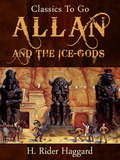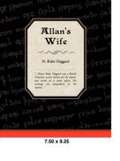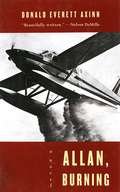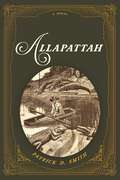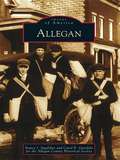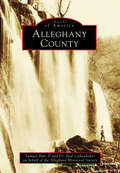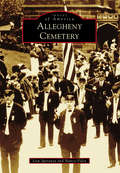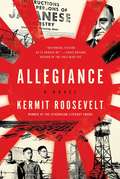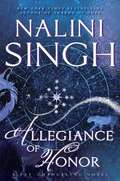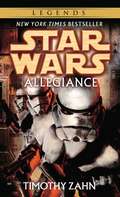- Table View
- List View
Allan and the Holy Flower (Classics To Go)
by H. Rider HaggardSir Henry Rider Haggard was an English writer of adventure novels set in exotic locations, predominantly Africa, and the creator of the Lost World literary genre. His stories, situated at the lighter end of the scale of Victorian literature, continue to be popular and influential. He was also involved in agricultural reform and improvement in the British Empire. “Allan and the Holy Flower” is a 1915 novel by H. Rider Haggard featuring Allan Quatermain. The plot involves Quatermain going on a trek into Africa to find a mysterious flower. (Excerpt from Wikipedia)
Allan and the Ice-Gods (Classics To Go)
by H. Rider HaggardThis novel is the final volume of the Allan Quatermain saga, and it comprises the fourth part of a loosely linked series begun with Allan and the Holy Flower. Once more Quatermain takes the hallucinogenic taduki drug, as he did in previous novels, and he finds himself reliving as Wi, an civilised man living in the barbaric ice age as part of a clan of cavemen. (Goodreads)
Allan's Wife
by H. Rider HaggardHenry Rider Haggard was a British Victorian writer known for his adventure novels set is exotic places. His writings are sympathetic to the natives. <P> <P> He often portrayed Africans as heroic in his stories even though the main characters are usually European. Allan's Wife is part of the Allan Quartermain series. Alan Quartermain was the main character in the novel King Solomon's Mines. He also appears in several sequels including Marie and the novel She which paired Quartermain with another Haggard character favorite Ayesha. . Quartermain was a progressive Victorian. He was a big game hunter in Africa who championed the cause of the natives.
Allan's Wife (Classics To Go)
by H. Rider HaggardSir Henry Rider Haggard was an English writer of adventure novels set in exotic locations, predominantly Africa, and the creator of the Lost World literary genre. His stories, situated at the lighter end of the scale of Victorian literature, continue to be popular and influential. He was also involved in agricultural reform and improvement in the British Empire. “Allan's Wife” - the story of Quartermain's early life, and his marriage to childhood sweetheart, Stella, mother of his son Harry. (Excerpt from Wikipedia)
Allan, Burning: A Novel
by Donald Everett AxinnHappily married with two beautiful children, successful architect and avid amateur aviator Allan Daniels finds his life plummeting into a nightmare when his wife suddenly announces that she wants a separation, maybe a divorce. Then, two days later, as he is piloting a seaplane from Long Island to Key West, the engine of his Cessna 185 seaplane sputters, then quits. Daniels's resolute skills as a pilot enable him to land safely in the Everglades, where a disheveled Miccosukee man named Tommy Handley finds him. But while Handley turns out to be from the same tribe as Daniels's mother, he also turns out to be a fugitive from justice, hiding out and evading capture in the protection of the remote swamps. When Daniels wakes in the middle of the night to find Handley groping for his wallet, Daniels defends himself--but accidentally kills his rescuer, then flees in his boat, from which locals later rescue him again. Daniels's explanation of what happened in the swamp doesn't sit well with savvy local lawman Sheriff Haskins, who suspects that Daniels is hiding something--but what? When Daniels finally confesses his guilt, it will set off a whole new chain of dire events in this fast-paced novel with enough twists and turns to keep you guessing until the final page.
Allapattah: A Novel
by Patrick D. SmithTwenty-five-year-old Seminole Toby Tiger lives in despair in the Florida Everglades. He loves the land and everything that exists in the natural world: the deer and egrets, turtles and herons, cypress trees and sawgrass, ponds and marshes, and, most of all, Allapattah, the crocodile. He watches helplessly as the white man imposes his will on the Seminoles, forcing them either to conform or to eke out a living wrestling alligators and carving trinkets for tourists. According to Toby, the whites &“destroy all that they touch." Toby refuses to bend to the white man's will and fights back the only way he knows how. He becomes Allapattah, a creature that earns his respect and protection.
Allbirds: Decarbonizing Fashion
by Michael W. Toffel Eren Kuzucu Ken PuckerAllbirds is a footwear startup focused on simple design, comfort, and sustainable natural materials. The case describes the company's product development process that works with suppliers to develop natural materials including wool and sugarcane to substitute for conventional petroleum-based materials and leather. The case is set in 2021, when Allbirds was extending its product range into apparel, and expanding beyond its online store to open more retail store around the world. Allbirds was freely sharing its know-how and material innovations with its competitors to try to scale its efforts to decarbonize fashion, but was also keen to remain ahead and differentiated based on simple design, comfort, and sustainable natural materials. The case highlights the growing the environmental impact of the footwear industry, including from its use of leather and fossil-fuel-based materials, and its focus on shorter product lifespans.
Allegan (Images of America)
by Carol Garofalo Allegan County Historical Society Nancy J. IngalsbeeDuring the summer of 1834, a group of eastern land investors set its sights on newly platted land at the "great bend" in the Kalamazoo River, now known as Allegan. This former site of a Pottawatomi village was blessed with both beauty and bounty. Surrounded by woods and with a river racing throughit, a busy community of commerce and recreation was envisioned. It was a perfect combination for enjoyable and productive lives for those who would purchase parcels of land. They could never imagine the many changes their riverside village would see--the part it would play in the rebuilding of Chicago after the Great Fire of 1871; Allegan's own devastating fire in 1884, which destroyed the downtown area; the arrival and departure of various businesses; and the phenomenon of countless local families who have had a continuous presence in Allegan for many generations. It is the stories behind these photographs of people, businesses, and events that bring Allegan's past to light in such a marvelous way.
Allegany County
by Dan WhetzelAllegany County's historical significance covers a broad range of topics and years. Established in 1789, the county rapidly developed in the 19th century due to transportation advantages, industrialization, natural resources, and the entrepreneurial spirit of its citizens. Allegany County's economy continued to expand in the 20th century, as additional industries made western Maryland their home. Industrial growth created towns and commercial opportunities that have shaped the county's character for more than two centuries.
Allegany County (Postcard History Series)
by Albert L. FeldsteinAllegany County was established in 1789 and is truly one of America's historic transportation and industrial centers. The images presented here portray this heritage and were selected with care from the author's collection of several thousand postcards. The book features Allegany's towns and communities, downtown business scenes, residential areas, industries, historic buildings, churches, schools, hospitals, floods, parades, coal mining, railroad stations, and historic and natural landmarks. In some cases, the personal messages sent on the back of the postcards are included.
Allegation: the page-turning, unputdownable thriller from an exciting new voice in crime fiction
by R. G. Adams'This searing debut from a retired social worker of 30 years could not be more timely - nor more true ... Harrowing, moving and written with a fearsome authenticity, the story forces the reader to question where the truth lies' Daily MailAn evil monster exposed? Or an innocent father condemned? A scandal will shake a small community to its very foundations.Two women have come forward to make historical sexual allegations against a pillar of the local community, Matthew Cooper. The case lands on the desk of inexperienced Social Worker, Kit Goddard, who must remove Cooper from his home and family while the investigation is carried out. Although intrepid and intuitive, she is ill-prepared for such a high-profile case.Kit finds herself navigating a local minefield of connections and class, reputations and rumour. Unsure whether her interference is a heroic intervention or a hurtful intrusion, she knows one thing: it will have an impact. The question is whether this impact will be to expose a lie, or destroy an innocent life...
Allegation: the page-turning, unputdownable thriller from an exciting new voice in crime fiction
by R. G. AdamsThere isn't going to be an easy way to say this . . .'An evil monster exposed?'. . . I'm afraid an allegation has been made'Or an innocent father condemned?A scandal will shake a small community to its very foundations.Sandbeach, South Wales. Two women have come forward to make historical sexual allegations against a pillar of the local community, Matthew Cooper. And child-safeguarding protocol demands that Social Services remove the accused from his home and his family, while a formal assessment is carried out.The Cooper case lands on the desk of inexperienced Social Worker, Kit Goddard. Although intrepid and intuitive, she is ill-prepared for such a high-profile case.Kit finds herself navigating a local minefield of connections and class, reputations and rumour. Unsure whether her interference is a heroic intervention or a hurtful intrusion, she knows one thing: it will have an impact. The question is whether this impact will be to expose an iniquitous lie, or destroy an innocent life...(P)2020 Quercus Editions Limited
Allegedly
by Tiffany D. Jackson<i>Orange Is the New Black</i> meets Walter Dean Myer’s <i>Monster</i> in this gritty, twisty, and haunting debut by Tiffany D. Jackson about a girl convicted of murder seeking the truth while surviving life in a group home.<p><p>Mary B. Addison killed a baby.<p> Allegedly. She didn’t say much in that first interview with detectives, and the media filled in the only blanks that mattered: a white baby had died while under the care of a churchgoing black woman and her nine-year-old daughter. The public convicted Mary and the jury made it official. But did she do it? <p>There wasn’t a point to setting the record straight before, but now she’s got Ted—and their unborn child—to think about. When the state threatens to take her baby, Mary’s fate now lies in the hands of the one person she distrusts the most: her Momma. No one knows the real Momma. But does anyone know the real Mary?
Alleghany County (Images of America)
by Alleghany Historical Society Dr Paul Linkenhoker Samuel Hale IIAlleghany County was formed in 1822 from parts of Botetourt, Bath, and Monroe Counties. The area was settled in 1746, and by the early part of the 19th century, a number of settlements and large farms were operating locally. Covington, Clifton Forge, Iron Gate, Longdale, Selma, Low Moor, and other small communities developed, and the natural resources in the area led to the establishment of several industrial operations. The railroad came to Selma in 1857, and after the Civil War, the Chesapeake & Ohio Railroad was completed to Huntington, West Virginia. The abundance of timber, rich deposits of iron ore, and accessibility to rails, rivers, and streams contributed to industrial growth. Brickyards, lumber mills, tanneries, iron smelters, and agricultural operations attracted other businesses and industries, bringing rapid growth to the area. In Covington, the West Virginia Pulp and Paper Company built a mill in 1899. Ever since, the company has served as the county's economic mainstay.
Allegheny Cemetery (Images of America)
by Lisa Speranza Nancy FoleyIt is easy to look at a place such as Allegheny Cemetery in Pittsburgh's Lawrenceville neighborhood and think that it encompasses strictly the dead. But a closer look reveals many lives and stories told throughout the pages of time by those who have lived them. To define Allegheny Cemetery as simply a place does not do it justice. It is not only a physical location, but a crossroads in history, and a point in time where each of these lives converge. Images of America: Allegheny Cemetery shares these legacies with the hope that present and future generations will do the same.
Allegheny Front: Stories (Mary Mccarthy Prize In Short Fiction Ser.)
by Lydia Millet Matthew Neill Null"Allegheny Front has few sentimental trappings. . . . Men's stubbornness is a rock face, in these intelligent and unpretentious stories, their anger a crown fire, their occasional tenderness a rill. . . . It remains at a distance from judgment, at a remove from easy definitions, unspooling a lucid and often painful history of appetite, exploitation, and bereavement."--Lydia Millet, from the introduction"Rich in history, speech, incident, flora, fauna, vernacular, geology, politics--Matthew Neill Null's work is dazzling. . . . If anything ever happened in the state of West Virginia, Null knows the long and short of it, and will make its story sing."--Salvatore ScibonaSet in the author's homeland of West Virginia, this panoramic collection of stories traces the people and animals who live in precarious balance in the mountains of Appalachia over a span of two hundred years, in a disappearing rural world. With omniscient narration, rich detail, and lyrical prose, Matthew Neill Null brings his landscape and characters vividly to life.Matthew Neill Null is the author of the novel Honey from the Lion (Lookout Books). A graduate of the Iowa Writers' Workshop and a winner of the PEN/O. Henry Award, his short fiction has appeared in the Oxford American, Ploughshares, the Mississippi Review, American Short Fiction, Ecotone, and elsewhere. He divides his time between West Virginia and Provincetown, Massachusetts, where he coordinates the writing fellowship at the Fine Arts Work Center.
Allegiance
by Cayla KluverHe couldn't help his past any more than he could help the way those intense, deep blue eyes pierced me and held me captive.An eighteen-year-old queen in love with the enemy as their countries pass the point of no return...Bound to a man she cannot love, Queen Alera of Hytanica must forget Narian, the young man who holds her heart. For Narian is destined to conquer Hytanica at the behest of his master, the powerful magic-user known as the Overlord. Alera doesn't truly believe Narian will fight against Hytanica-until Cokyrian troops attack with Narian commanding the charge.Faced with the greatest betrayal a heart can know, Alera must set aside personal feelings and lead her kingdom through its darkest time. And when all hope, will and courage seem lost, she must find strength and remember that even the blackest night must have a dawn....
Allegiance
by Kermit RooseveltA sophisticated legal thriller that plunges readers into the debate within the US government surrounding the imprisonment of thousands of Japanese-Americans during World War II.When the news broke about the Japanese attack on Pearl Harbor, Caswell "Cash" Harrison was all set to drop out of law school and join the army... until he flunked the physical. Instead, he's given the opportunity to serve as a clerk to Supreme Court Justice Hugo Black. He and another clerk stumble onto a potentially huge conspiracy aimed at guiding the court's interests, and the cases dealing with the constitutionality of the prison camps created to detain Japanese-Americans seem to play a key part. Then Cash's colleague dies under mysterious circumstances, and the young, idealistic lawyer is determined to get at the truth. His investigation will take him from the office of J. Edgar Hoover to an internment camp in California, where he directly confronts the consequences of America's wartime policies. Kermit Roosevelt combines the momentum of a top-notch legal thriller with a thoughtful examination of one of the worst civil rights violations in US history in this long-awaited follow-up to In the Shadow of the Law.ce during war...
Allegiance Sworn
by Kylie GriffinThere is no mercy in the demon realm. No escape. In this place of desperation and conflict, anyone who is not purebred is virtually powerless. Until a demon leader seeks to unify the races... With the alliance of the humans and the half-blood Na'Chi forged, the demon Na'Reish prepare for war by seizing human blood-slaves. Captured during a rescue mission-gone-wrong, Light Blade warrior Arek Barial finds himself claimed by a Na'Reishi female who offers him an unexpected choice. Raised in the elite ranks of a society she abhors, Imhara Kaal lives a dangerous double life as a Na'Reish Clan-leader and an advocate for a caste-free life that honors the Old Ways. Openly rebelling against the Na'Reish would mean her death, unless she can find an emissary willing to present her petition to the human Blade council. But Arek isn't about to blindly follow a demon--despite the intense attraction growing between them. And while hatred for the Na'Reish is all he has ever known, Arek must learn to trust Imhara, or risk the destruction of all three races...
Allegiance of Honor
by Nalini SinghThe "unparalleled romantic adventure"* of Nalini Singh's New York Times bestselling series continues as a new dawn begins for the Psy-Changeling world... A staggering transformation has put the Psy, humans, and changelings at a crossroads. The Trinity Accord promises a new era of cooperation between disparate races and groups. It is a beacon of hope held together by many hands: old enemies, new allies, wary loners. But a century of distrust and suspicion can't be so easily forgotten, and it threatens to shatter Trinity from within at any moment. As rival members vie for dominance, chaos and evil gather in the shadows and a kidnapped woman's cry for help washes up in San Francisco, while the Consortium turns its murderous gaze toward a child who is the embodiment of change, of love, of piercing hope: a child who is both Psy...and changeling. To find the lost and protect the vulnerable--and to save Trinity--no one can stand alone. This is a time of loyalty across divisions, of bonds woven into the heart and the soul, of heroes known and unknown standing back to back and holding the line. But is an allegiance of honor even possible with traitors lurking in their midst? *Publishers Weekly on Shards of HopeFrom the Hardcover edition.
Allegiance of Honour: Book 15 (The Psy-Changeling Series)
by Nalini SinghThe 'unparalleled romantic adventure'* of Nalini Singh's New York Times bestselling series continues as a new dawn begins for the Psy-Changeling world . . .The Psy-Changeling world has undergone a staggering transformation and now stands at a crossroads. The Trinity Accord promises a new era of cooperation between disparate races and groups. It is a beacon of hope held together by many hands: old enemies. New allies. Wary loners.But a century of distrust and suspicion can't be so easily forgotten and threatens to shatter Trinity from within at any moment. As rival members vie for dominance, chaos and evil gather in the shadows and a kidnapped woman's cry for help washes up in San Francisco, while the Consortium turns its murderous gaze toward a child who is the embodiment of change, of love, of piercing hope: a child who is both Psy . . . and changeling.To find the lost, protect the vulnerable and save Trinity no one can stand alone. This is a time of loyalty across divisions, of bonds woven into the heart and the soul, of heroes known and unknown standing back to back and holding the line. But is an allegiance of honour even possible with traitors lurking in their midst?
Allegiance of Honour: Book 15 (The Psy-Changeling Series)
by Nalini SinghThe Psy-Changeling world has undergone a staggering transformation and now stands at a crossroads. The Trinity Accord promises a new era of cooperation between disparate races and groups. It is a beacon of hope held together by many hands: old enemies. New allies. Wary loners.But a century of distrust and suspicion can't be so easily forgotten and threatens to shatter Trinity from within at any moment. As rival members vie for dominance, chaos and evil gather in the shadows and a kidnapped woman's cry for help washes up in San Francisco, while the Consortium turns its murderous gaze toward a child who is the embodiment of change, of love, of piercing hope: a child who is both Psy . . . and changeling.To find the lost, protect the vulnerable and save Trinity no one can stand alone. This is a time of loyalty across divisions, of bonds woven into the heart and the soul, of heroes known and unknown standing back to back and holding the line. But is an allegiance of honour even possible with traitors lurking in their midst?
Allegiance to Alsace
by Marta Anne Tice"This is a fast moving read with well documented history.The year is 1805. Napoleon Bonaparte is rampaging Europe for domination, threatening the eastern regions of Germany. Annaelise Theiss is the daughter of a German winemaker, Count Karl Theiss, and of a former Parisian aristocrat, Louisa Guerlain. The young heroine is torn between her mother’s allegiance to the new French Regime and her father’s thinking influenced by the Enlightenment from German philosophers and the American Founding Fathers. Espionage against the Emperor is everywhere.As a young ingenue, Annaelise witnesses conflicting messages. She experiences the former glory of the French aristocracy while visiting a distant cousin in Bavaria with her family. When coming of age, her heart becomes clouded in deception and mystery. Her journey takes her further from the winery and brewery lifestyle in Alsace-Lorraine, to her father’s family vineyard home in the Pfalz, Germany. It is there that she connects with her German heritage and lifestyle. The plot takes a new twist when she falls in love with a courageous French officer, Captain Hans Roster. From ballrooms to battle scenes, this spellbinding story will keep you engaged with each chapter.“. . . Readers will easily become attached to Annaelise and feel her joy and her sorrow as she lives through one of the most fascinating periods in history. If you are an avid reader of historical romance novels, you will love Allegiance to Alsace.”– JOANNE DIMAGGIO, MA, CHT, author of Soul Writing: Conversing with your Higher Self“On a visit to the Pfalz in Germany and the Alsace-Lorraine region of France as a young girl, Marta Anne Tice had a vivid déjà vu experience of living in the eighteenth and nineteenth century. So it comes as no surprise that her novel brilliantly recreates the sparkling pageantry and powerful history of the Napoleonic era of that bygone time. A wonderful read!”– STEFAN BECHTEL, author of Through a Glass, Darkly and Mr. Hornaday’s WarThe author’s information and book trailer can be found on: www.martaatice.comContact the author through BQB or through her email: martaleapoffaith@gmail.com "
Allegiance: Star Wars (Star Wars - Legends)
by Timothy ZahnNever before has the incendiary mix of action, politics, and intrigue that has become Timothy Zahn's trademark, been mmore evident that in this new Star Wars epic. On the heels of the stunning events chronicled in Star Wars: A New Hope, the newly minted heroes of the Rebellion-fledgling Jedi Luke Skywalker, smuggler turned reluctant freedom-fighter Han Solo, and Princess Leia Organa, a bold leader with a world to avenge-must face the harsh realities of the cataclysmic conflict into which they have so bravely plunged. From this point forward, legends will grow, treachery will abound, and lives will be irrevocably altered, in the long, hard fight to counter the fist of tyranny and restore hope to a galaxy too long in darkness. The destruction of the Death Star by the Rebel Alliance was a decisive blow against the Empire, but Palpatine and his monstrous enforcer, Darth Vader, are no less of a threat. The brutal extermination of Alderaan not only demonstrated the magnitude of their murderous power, but served as a chilling testament to their resolve to crush the Rebel uprising. Standing against them, Skywalker, Solo, and the Princess remain uncertain opponents. Luke is gifted and brave, but unschooled in the power he possesses. Han has doubts about waging someone else's war-and his contentiousness is one more burden for Leia to bear as she struggles to help keep the Rebellion alive. The three have been sent to mediate a dispute between Rebel Alliance factions in Shelsha Sector-agitating matters by forcing Han to deal not only with pirates, but with his more dreaded enemy, politics. At the same time, Mara Jade-all of eighteen and years away from her fateful meeting with Luke-is serving her evil master, Palpatine, well in her role as the Emperor's Hand: tracking suspected treachery in the Empire to what may be high places-while trying to stay out of Darth Vader's way.But the Rebels will prove to be only one of the Empire's concerns. For Imperial Stormtrooper Daric LaRone, his faith in the Empire shaken by the wanton destruction of Alderaan, will commit a sudden and violent act of defiance, and take four other enforcers with him, in a desperate bid to elude their masters' wrath.Each of these fateful actions, whether sanctioned, secret, or scandalous, will expose brutality and corruption, spur upheavals destined to shake the Empire to its core, and shape momentous events yet to come. Features a bonus section following the novel that includes a primer on the Star Wars expanded universe, and over half a dozen excerpts from some of the most popular Star Wars books of the last thirty years!
Allegiances (The Battling McGuire Boys #6)
by Cynthia EdenAn old enemy returns...with a new victim in the conclusion of The Battling McGuire Boys by New York Times bestselling author Cynthia Eden Private investigator Sullivan "Sully" McGuire has a reputation for danger. He's spent most of his life tracking the men who murdered his parents. The one woman who sees past Sully's predatorial pursuit is the wife he abandoned years ago. But Celia James has returned, this time with a target on her back. In order to save Celia, Sully is forced to resurrect old demons. New dangers-and dormant desires-bring Sully and Celia closew...and old enemies even closer.

